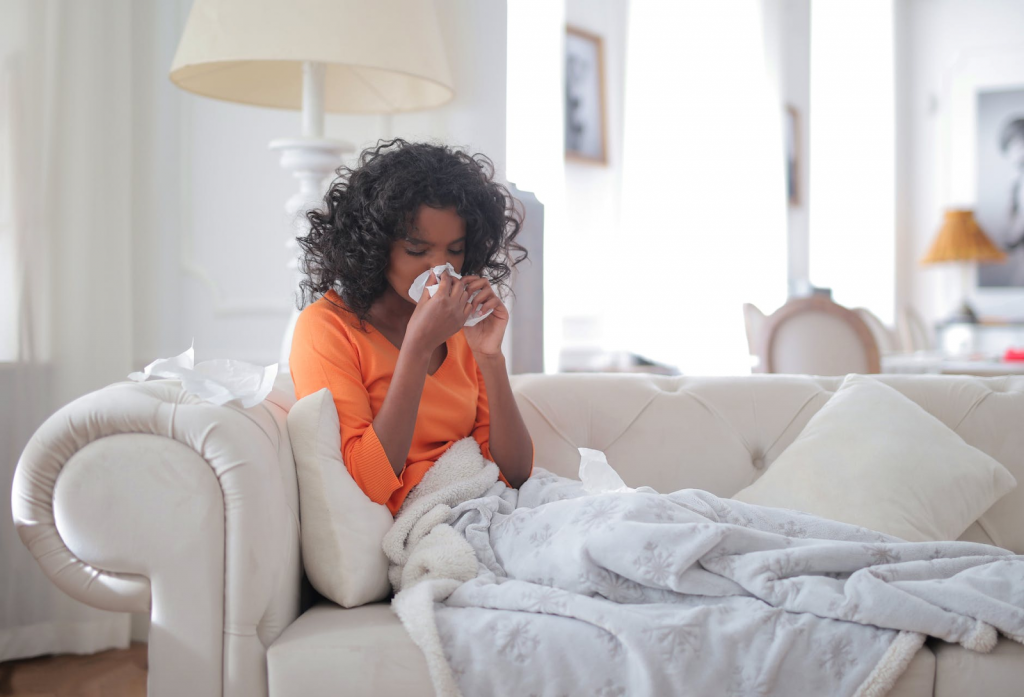
A seasonal allergy or hay fever occurs when your immune system overreacts to a foreign substance. Once your body comes into contact with this allergen, it will trigger an allergic response. Allergens are everywhere and the most common allergens are pollen, dust, mold, and animal dander. They’re so common that in the United States, allergies are the 6th leading cause of chronic illness.
If you’re one of the millions of people that suffer from allergies, then you’re no stranger to the uncomfortable symptoms that come with them, like watery eyes, an itchy nose and skin, and sinus congestion. But did you know that on top of that, allergies can also make you tired?
In fact, allergy fatigue is so common that there’s even a scientific name for it — “brain fog.” This is defined as tiredness due to allergies that makes it difficult to focus on tasks or function properly throughout the day.
Read on to learn some simple tips on ways to manage your allergy fatigue.
The link between allergies and fatigue
There are a few reasons why your allergies could be making you tired. First, exposure to allergens triggers an immune response that is meant to protect you from unknown allergens, however, this produces a chemical called histamine which is known to cause fatigue.
Allergy symptoms such as congestion and coughing may cause discomfort, not to mention wake you up during the night, making it difficult to get a full, uninterrupted night’s sleep — contributing to feelings of fatigue during the day. Finally, taking allergy medications, like antihistamines, to combat or prevent allergy symptoms may also lead to drowsiness during the day, as well.
Preventing allergy fatigue and brain fog

There is no cure for allergies, however, there are several things that you can do to help alleviate your symptoms and fatigue.
Allergy-Proof Your Home
Allergens can exist indoors so making sure you are maintaining a clean home environment is crucial when preventing allergy symptoms that result in fatigue. Adding allergy-proofing chores like dusting, replacing air filters, and vacuuming into your cleaning routine can go a long way when reducing your symptoms.
Find the Source of Your Symptoms
To help prevent allergy symptoms so you can function normally during the day and sleep well at night, start by finding the source of your symptoms. You can do this by taking an allergy test or by keeping an allergy log to track what you have been exposed to and what symptoms you may have. Visiting an allergist who specializes in allergies is also a great way to find the source of your symptoms fast.
Eliminate Exposure
Once you’ve identified what’s causing your allergy symptoms, it’s recommended that you do your best to eliminate or reduce your exposure to it whenever possible. If you’re suffering from an indoor allergy, there are several easy ways to allergy-proof your home.
For outdoor allergens, like mold and pollen, monitoring the allergen-count and limiting your time outside during high exposure days are great ways to prevent allergy symptoms and fatigue.
Take Medication
Over-the-counter medications that contain antihistamines can be an easy and effective way to manage both year-round and seasonal allergy symptoms. Be sure to ask your healthcare provider or pharmacist which over-the-counter allergy medication would be least likely to make you feel drowsy.
Tips for managing daytime fatigue

If you are experiencing daytime sleepiness during allergy seasons, there are a few simple lifestyle changes you can make to improve your energy levels.
- Stay hydrated
- Move your body throughout the day
- Reduce sugar intake
- Maintain a healthy diet
- Spend time outdoors and in the sun
- Take breaks throughout the day
Ways to get a good night’s sleep with allergies
When your allergies are acting up, it can be difficult to get comfortable and get a good night’s sleep, which can contribute to your daytime fatigue. If your allergies are keeping you up a night, it’s important to take the popper steps to get a full 9-7 hours of sleep each evening.
Eliminating allergens from the bedroom and making yourself comfortable may help you fall asleep and stay asleep even if you are an allergy suffering. Here are 5 ways to sleep better with allergies:
- Take a shower before bed
- Wash your sheets regularly
- Keep your head elevated
- Remove pets from the bedroom
- Use an air purifying device
Allergies can impact your quality of life, so learning how to manage your allergy fatigue is important. If you’re suffering from allergy fatigue, check out the infographic below for tips to stay alert during the day and reduce your symptoms at night!

Originally posted on October 1, 2020 @ 4:00 pm